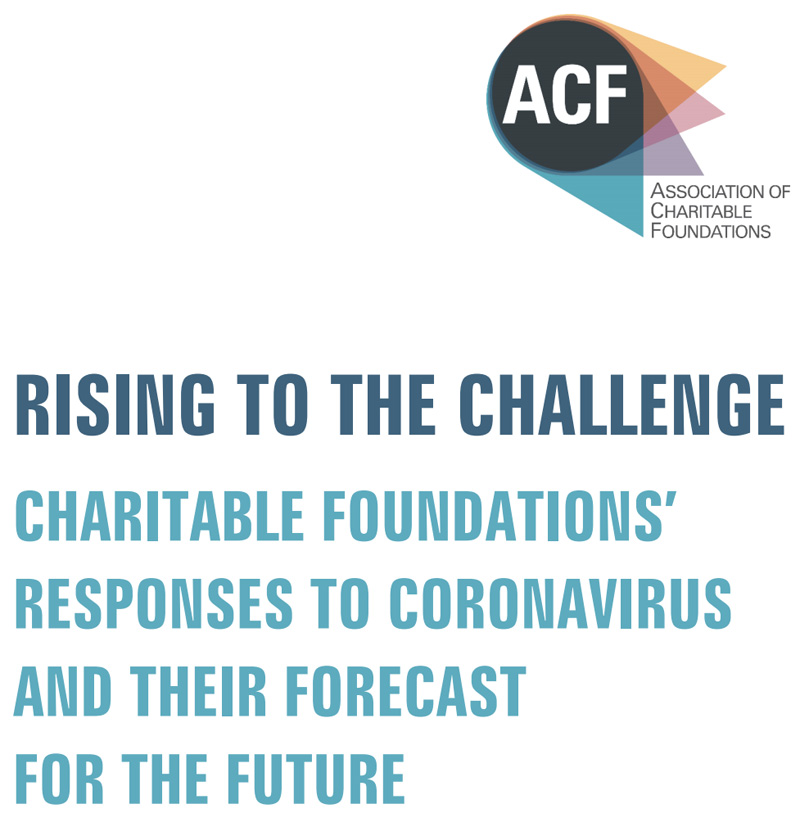Foundations are rising to the challenge in response to increased demand caused by coronavirus
13 April 2021
9 out of 10 charitable foundations expect to maintain or increase grant funding for civil society in 2021, but many predict financial turbulence, according to new research by ACF.
 Research published today by ACF found that nearly all foundations are planning to maintain or increase spending on grants to civil society organisations in 2021 (86%), even though 40% are expecting a negative impact on their own finances.
Research published today by ACF found that nearly all foundations are planning to maintain or increase spending on grants to civil society organisations in 2021 (86%), even though 40% are expecting a negative impact on their own finances.
Many foundations plan to maintain or return to their usual funding programmes or areas of focus in 2021, but apply a ‘coronavirus lens’ to their work or offer additional support particular groups that have been most affected. Half plan to create or renew coronavirus-specific funding programmes this year, while more than 8 out of 10 stated an ongoing commitment to increased flexibility for grantees and reduced administration for funding applicants.
A survey of ACF members conducted in mid-March 2021 received responses from 80 foundations across the UK, with balanced representation from small, medium and large grant-making charities. It found that:
- Nearly all respondents (96%) said they changed their work in 2020 in response to the coronavirus pandemic – including new grant programmes, increased funding, closer collaboration with other funders and overhauls to how they assess applicants.
- 45% plan to maintain their 2020 level of grant spending in 2021 and 41% plan to increase it, but many were uncertain about the longer term.
- Nearly half are planning to establish a new fund or re-align grant programmes in 2021 to focus on direct support for people or sectors most affected by coronavirus.
- 84% said that they would continue to offer the flexibilities around reporting and payments that they introduced in 2020, with some stating this will remain a permanent feature of their practice.
- Two thirds say they will work differently in 2021 because of the ongoing impact of the pandemic, with nearly half of this group intending to do so throughout the year, and the same number saying they thought this would extend beyond 2021.
Introducing the report, ACF chief executive Carol Mack said:
“I’m proud of how foundations have stepped up and continue to do so. I also want to acknowledge the immense effort of staff and trustees, who have worked intensively and with enormous dedication, aiming to ensure their foundation’s resources achieve maximum benefit in these difficult times.
“I’m mindful of the scale of the challenges that society faces. Funding remains very tight for charities and there are real risks for many as government support schemes wind down. Foundations will continue to play their part but the government needs to keep under review the need for wider support.”
Commenting on the research, ACF’s head of policy and author of the report, Max Rutherford, said:
“In 2020, foundations across the UK stepped up to meet the hugely increased need of the communities and causes they care about. We now know this support is likely to continue in 2021, with funding levels to be maintained or increased in nearly all cases."
"We also welcome the finding that many of the positive changes to funder processes – such as increased flexibility for grantees and reduced administration for applicants – are set to be embedded beyond the emergency response”.
Central to the responses was evidence of foundations striving to help applicants and grantees in this unprecedented context. One foundation noted: “We have become more flexible with our funding and provide core, capital, project costs, or a combination - whatever will help the charity the most”.
70% of foundations report the same or more demand on their resources at the start of 2021 as after the first lockdown a year ago. Several foundations reported plans or actions to create specific funding programmes or ringfenced funding for Black, Asian and Minority Ethnic-led organisations and communities.
One said: “We are looking to support more BAME partnerships based on the impacts of Covid and the Black Lives Matter campaign”.
Another theme was increased collaboration, with three quarters reporting on activities in 2020 to work more closely with other funders, to increase alignment and avoid duplication. This included information sharing, pooling of funds and aligning strategic priorities, and most intend to continue to collaborate in these ways in 2021.
One said: “We continued our usual funding programme, but offered more flexibility in terms of delivery and reporting."
"We have also increased support (in addition to funding) to existing grantees and joined a funder collaboration as an aligned funder. This was all happening as we switched all our systems to remote operation.”
Foundations have not been immune from the impact of the pandemic, and many referenced strains on their own staff and systems. Some reported negative impacts on their finances, resulting in constricted grants budgets, redundancies, and operational challenges. 40% of foundations forecast that their finances will be negatively impacted by the pandemic, although half predict no change.
Despite this, nearly 9 out of 10 foundations plan to either maintain grant spending (45%) or increase it (41%) in 2021, with only a few (14%) intending to allocate less.
Small funders were the most likely to predict no impact from the pandemic on either their finances or their grants budgets (75%). Conversely, the largest foundations giving more than £5m per year expect to be the most affected – half forecasting a negative impact on their finances. A quarter of these largest funders anticipate that their grant budgets could decrease but a third predict an increase.